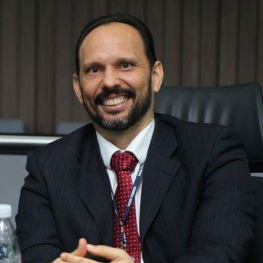
George Augusto Batista Câmara
GET-COFUND MarieS.Curie Fellow at URJC
Geological Reservoir Use: Technologies for Oil and Gas Exploitation Increase x New Trends
About the research project «Geological Reservoir Use: Technologies for Oil and Gas Exploitation Increase x New Trends»
Research line: Energy Transition: Implementing the European Roadmap 2050 / Susana Galera Rodrigo
Mentor: Profa. Susana Galera Rodrigo (URJC)
Abstract
Stimulate the increase of Smart Energy solutions have become one of the main challenges for a sustainable world. The integration between several options of renewable generation and its storage, beside the integration between non-renewable generation, is part of this reality. Smart Energy issues related to energy efficiency and renewable energy, such as sustainable energy, carbon dioxide (CO2) capture, storage and utilization technologies (CCUS) and smart energy systems with energy storage, can have in common the geological reservoirs use. The search of energy security via renewable generation, promoting the use of low-carbon energy technologies, and consequently the transition to a low-carbon economy, pass by Residues Storage (RS) or Energy Storage (ES) in large scale solution. The main objective of this project is to create a specific decision-making method for the use of geological reservoirs, considering their possible future uses for RS and ES. The decision-making process must consider, for example, that some techniques to increase the production of oil and gas in the reservoirs may make it impossible for them to be used later for RS and ES. It is possible to affirm that themes relating to geology, reservoir engineering, economy, environment, safety, preliminary assessment, public perception, regulatory issues are essential for the development of the decision-making method.
About George Augusto Batista Câmara
George is a researcher, professor and businessman. Conducts research on Sustainable Development. He worked in the Bahia´s Federation of Industries, specializing as an Agent of Innovation and Technological Diffusion and as a Work Safety Engineer, where he developed methodologies for the implementation of quality management systems and of work safety and led multidisciplinary teams to meet the industry demand and its suppliers.
He obtained a master’s degree in Regulation of the Energy Industry in 2009, developing his work in the area of Environment, Oil and Gas and focusing on a proposal for a Brazilian regulation for Carbon Dioxide (CO2) injection in geological reservoirs. He earned his PhD in Industrial Engineering in 2012 in the concentration area Processes and Products Sustainable Development. His research was the Capture and Geological Storage of CO2 (EOR / CCS) technologies analysis and its possible applications in the Recôncavo Baiano Oil Basin with the objective of increasing hydrocarbons recovery through the use of advanced techniques with the use of CO2. To support the research, he completed a six-month internship at the United Nations University (UNU) in Yokohama, Japan, in 2012. From 2014 to 2018 he did his postdoctoral in Industrial Engineering, giving continuity to the doctoral research-es, and focusing his researches in large-scale energy storage using the subsoil. He had focus on technical, environmental, safety, economic feasibility and public perception issues in underground storage technologies (Residues Storage and Energy Storage) in geological reservoirs. He was member of the Brazilian delegation at the COPs of Cancun, Paris, Marrakesh and Bonn.


